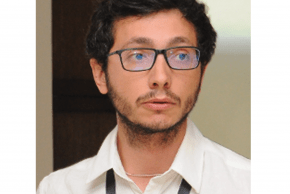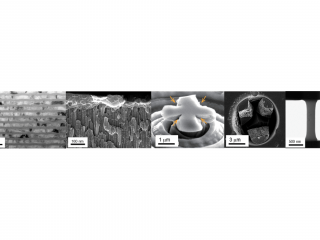Strong and ductile metallic thin films through advanced nanoengineering design strategies
The current trend toward miniaturization in devices components in key technologies such as micro-/nanoelectronics, energy production, sensors and wear protection requires the development of high-performance nanostructured films with superior mechanical properties. Especially, mutually excluding structural properties such as high yield strength and ductility need to be combined, but also high adhesion with the substrate and large fatigue resistance. In order to trigger microstructure-induced material properties, control of the micro-scale structure, atomic composition, average grain size, and layer/film thickness must be optimized based on nanoengineering design concepts. In addition, measuring the properties of thin films (thickness ≤1 m) requires the development of novel techniques capable to probe their mechanical behavior[1].
Here, I will present recent results for several class of advanced thin film materials including nanostructured metallic glasses (ZrCu, ZrCuAl…)[2-4] high entropy alloys (CoCuCrFeNi, Al/CoCuCrFeNi) and multilayers (fully amorphous, amorphous/crystalline, FCC/BCC)[5], highlighting how the control of micro-structure affect the and micro-scale mechanical behavior and enable ultimate mechanical properties. Special emphasis will also be dedicated to present several cutting-edge techniques used to extract the mechanical/electrical behavior at the micro- and nanometer scale, involving, in situ SEM nanoindentation and micro-pillar compression, and tensile test in situ TEM.
Finally, I will present recent developments within LSPM, highlighting new research activities dealing with the synthesis of nanostructured metallic films and the development of a new platform for in situ SEM mechanical-electrical characterization.
Références
[1] J. Ast, M. Ghidelli, K. Durst, M. Goeken, M. Sebastiani, A.M. Korsunsky, A review of experimental approaches to fracture toughness evaluation at the micro-scale, Mater. Design 173 (2019) 107762.
[2] M. Ghidelli, A. Orekhov, A.L. Bassi, G. Terraneo, P. Djemia, G. Abadias, M. Nord, A. Béché, N. Gauquelin, J. Verbeeck, J.-P. Raskin, D. Schryvers, T. Pardoen, H. Idrissi, Novel class of nanostructured metallic glass films with superior and tunable mechanical properties, Acta Mater. 213 (2021) 116955.
[3] C. Poltronieri, A. Brognara, F. Bignoli, S. Evertz, P. Djemia, D. Faurie, F. Challali, C. Li, L. Belliard, G. Dehm, J.P. Best, M. Ghidelli, Mechanical properties and thermal stability of ZrCuAlx thin film metallic glasses: Experiments and first-principle calculations, Acta Mater. 258 (2023) 119226.
[4] A. Brognara, J.P. Best, P. Djemia, D. Faurie, G. Dehm, M. Ghidelli, Effect of composition and nanostructure on the mechanical properties and thermal stability of Zr100-xCux thin film metallic glasses, Mater. Design 219 (2022) 110752.
[5] G. Wu, C. Liu, A. Brognara, M. Ghidelli, Y. Bao, S. Liu, X. Wu, W. Xia, H. Zhao, J. Rao, D. Ponge, V. Devulapalli, W. Lu, G. Dehm, D. Raabe, Z. Li, Symbiotic crystal-glass alloys via dynamic chemical partitioning, Mater. Today 51 (2021) 6-14.
Biographie
Dr. Matteo Ghidelli is permanent CNRS researcher at Laboratoire des Sciences des Procédés et des Matériaux (LSPM) and Guest Group Leader at the Max-Planck-Institut für Eisenforschung (MPIE, Germany), since 2020. After a double master degree in materials engineering at both Politecnico di Milano and Turin (Italy), he completed a joint PhD (2015) at the Université Grenoble Alpes (UGA, Frence) and the Université catholique de Louvain (UCL, Belgium) within the framework of the International Doctoral School in Functional Materials (IDS-FunMat). He continued his career as postdoctoral fellow at University of Rome Tre (Italy) and at Politecnico di Milano (Itlay) and then as Group Leader at MPIE (Germany) heading the group of “Thin films & Nanostructured Materials”. His main research interests are represented by the synthesis of nanostructured thin films through innovative nanoengineering concepts/techniques and the mechanical/functional characterization especially with in situ techniques. At the present, he supervise 6 PhD students and 1 postdoc. He is author of 38 paper in peer review journals and provided several invited lectures and seminars, while securing several national and international funds. In 2022 he obtained the “Habilitation à diriger des recherches (HDR)” from the Sorbonne Pairs Nord University.

